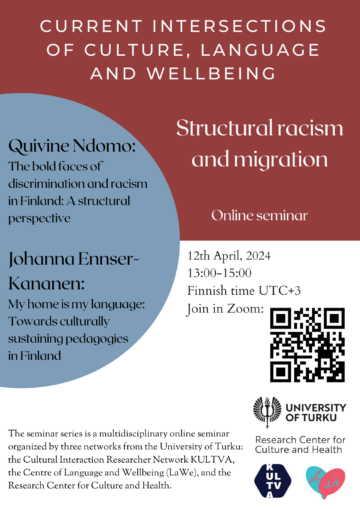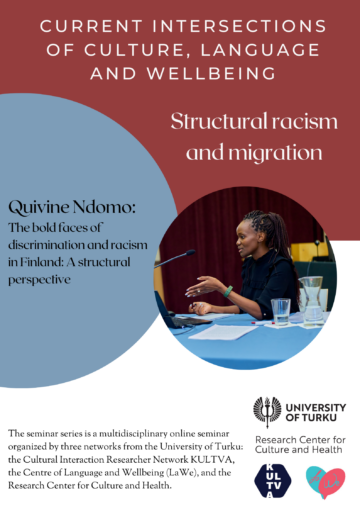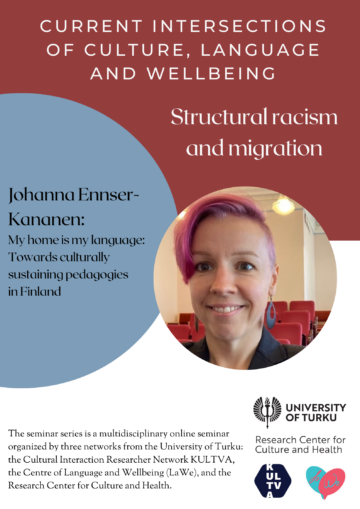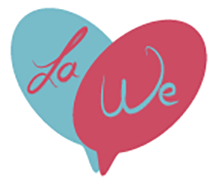Current Intersections of Culture, Language and Wellbeing 12.4.
Suosittu seminaarisarja saa jatkoa!
Current Intersections of Culture, Language and Wellbeing on monitieteinen etäseminaarisarja, jota järjestää yhteistyössä kolme Turun yliopiston tutkimusverkostoa: LaWe, KULTVA sekä Kulttuurin ja terveyden tutkimusyksikkö. Seminaarisarjan tarkoituksena on laajentaa verkostoja ja tuoda yhteen kansainvälistä tutkimusta sosiaalitieteiden, humanististen tieteiden ja kielitieteiden saralla liittyen terveyteen ja hyvinvointiin. Seminaarisarja jatkuu tuttuun tapaan Zoomissa. Seminaaria on myös mahdollista seurata yhdessä muiden kanssa Turun yliopistolla, Publicumilla (Assistentinkatu 7), huoneessa 399.

Seminar series Current Intersections of Culture, Language and Wellbeing presents:
Structural racism and migration
Time: 12.4.2024, 13:00-15:00 (EEST / UTC+03:00)
Place: Zoom (https://utu.zoom.us/j/62202813771)
NB! There is also a possibility to follow the seminar together in Publicum (Assistentinkatu 7), seminar room 399 (University of Turku, Finland).
The online multidisciplinary seminar series Current Intersections of Culture, Language and Wellbeing continues!
Join us for an exploration of a pressing question in today’s landscape – structural racism and migration. This fourth webinar of the series will dive into two perspectives on issues which have been contentious for the past couple of years. Finland prides itself in being the happiest country for a number of years in a row and a model country for equality, despite having numerous reports and studies on the state of racism and inequality. What are then issues and phenomena that may be hidden beneath the facade of the model country for equality and the world’s happiest country? For this session we have two presentations: First, Quivine Ndomo will talk about discriminative structures that shape the lives of non-EU citizens and so-called ”second generation migrants”, a presentation which is based on her PhD dissertation. Our second presentation is by Johanna Ennser-Kananen, who will discuss how language and racialization interact and how we can move toward culturally sustaining pedagogies in Finland. We have reserved plenty of time for discussion and questions and we welcome an open and respectful discussion!
The seminar series Current Intersections of Culture, Language and Wellbeing is a multidisciplinary online seminar organized by three networks from the University of Turku, Finland: the Cultural Interaction Researcher Network KULTVA, the Centre of Language and Wellbeing (LaWe), and the Research Center for Culture and Health. The aim of the seminar is to foster international networking and research collaboration between social sciences, humanities, and linguistics, focusing on topics related to health and wellbeing.
Presentations:
 Quivine Ndomo (University of Jyväskylä, Finland)
Quivine Ndomo (University of Jyväskylä, Finland)
The bold faces of discrimination and racism in Finland: A structural perspective
In my presentation, I will discuss empirical illustrations of blatant discriminative structural processes and norms that shape the labour market integration experiences of Third-country national migrants in Finland. My objective is to draw attention to critical structures such as Finland’s migration regime, focus on some of their functions that are otherwise missed, and show how they affect the lives of non-EU/EEA citizens, and people who are discriminatively perceived and treated as non-EU citizens such as the so-called “second generation migrants”. The presentation is based on my doctoral dissertation, which is based on 51 biographical narrative interviews with 44 individuals who migrated to Finland for studies, and 7 for family and international protection purposes. 45 participants were Black Africans.
In the whole group discussion, I will be happy to have webinar participants bring in their takes on the intersection of culture and well-being specifically, but also language where that is possible.
 Johanna Ennser-Kananen (University of Jyväskylä, Finland)
Johanna Ennser-Kananen (University of Jyväskylä, Finland)
My home is my language: Towards culturally sustaining pedagogies in Finland
How do language and racialization interact? Why does this interaction matter in language education? And how does all of this relate to wellbeing? In this presentation, I discuss these questions based on examples from an adult basic education context in rural Finland. Data thus stems from my long-term engagement with a community college that serves adult students who are forced migrants from mostly African and West Asian countries. I understand wellbeing broadly as striving towards social justice, educational equity, and belonging, and show how these are challenged if language use/learning orient towards white and Eurocentric norms. I also provide examples of language use as a means of resistance and home making. Together, these examples make an argument for implementing culturally sustaining pedagogies in Finnish educational contexts.
———————
Quivine Ndomo is a University teacher at the University of Jyväskylä and a project researcher on the JUSTMIG project funded by the European Commission’s DG Employment, and the SINKING ISLANDS project funded by the KONE foundation. My research interprets and problematises the labour market structures for migrant workers in the EU from a social constructivist lens, using multiple theories including theories of citizenship rights, welfare, disaggregated human agency, social construction, and justice among others.
Johanna Ennser-Kananen is an Associate Professor of English and Academy Research Fellow at the University of Jyväskylä’s Department of Language and Communication Studies. Her work focuses on linguistically and culturally sustaining language and teacher education, particularly on epistemic justice in educational contexts. This entails the deconstructing of white, Eurocentric, and anthropocentric norms and the search for more sustainable and community-guided ways of being an academic.
